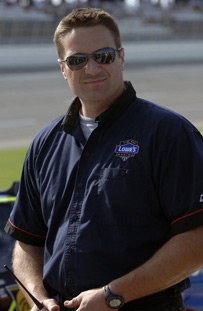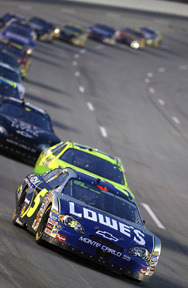Engineering grad Chad Walter makes stock cars go incredibly fast
By Linda Myers

Chad Walter has made it to victory lane twice in the Daytona 500 -- the "Super Bowl" of the National Association of Stock Car Auto Racing (NASCAR) -- not behind the wheel of a winning stock car but on the team that engineered it.
"I've always been on the safe side of the pit lane," he says. Now a crew chief at Hendrick Motorsports, Walter has been in the business of building fast stock cars since he graduated from Cornell in mechanical engineering in 1993. The cars can reach top speeds of 200 miles an hour.
Recently Walter spoke about his life and career during a break at Watkins Glen International, a raceway 25 miles west of Ithaca, where he was readying his team's car for a NASCAR Busch series 82-lap, 200-mile race the following day.
The race's location feels like home territory to Walter because it is only two hours southeast of Albion, N.Y., the town of 5,000 where he grew up. The Glen is one of two remaining road courses in the NASCAR circuit, and Walter saw his first race there as a high schooler in the late 1980s when an uncle who raced cars took him.
"I was awestruck by the cars and how they went up different parts of the track," says Walter. The speed and noise thrilled him then, and still do.
When Walter joined the Formula Society of Automotive Engineers' race car design team at Cornell, the team won the national competition twice, helping cement his love of racing. About the rest of his Cornell experience, Walter says, "I loved every minute." A math and science whiz, he switched from landscape architecture to engineering and played defensive end on the Big Red football team, helping to win an Ivy League championship in 1990.

After graduation, he headed to stock car country -- North Carolina. The plan: "To get it out of my system, then go to graduate school." Instead he stayed, learned how to build the cars by doing and rose through the ranks to his current position.
Stock car racing has matured, too, and is now the No. 2 televised professional sporting event in the nation, second only to football. Because of the exposure, sponsors invest millions of dollars in the vehicles, and advertisers vie to get product names on the fastest cars. The intense competition, with milliseconds separating the winning car from the runner-up, has changed the way the cars are engineered.
"There's nothing stock about a stock car today," comments Walter. "Most people don't realize how much there is in getting these cars to do what they do."
Indeed, his team's car -- a bright blue and yellow Chevrolet with the number "5" and "Lowe's" emblazoned on it -- bears little resemblance to a standard Chevy. The enormous tires are virtually without tread to increase speed. "They're like gumballs -- they lay a lot of rubber on the track," says Walter. And the 800-horse-power engine is modified from race to race to improve the car's performance on different tracks. Walter calls the final product "a masterpiece, like a Mona Lisa or a fighter jet. If everything works out right, it's engineering perfection."
Off the track, Walter drives a seasoned 1997 pickup -- perhaps because he is married and a father to four. "I love my little truck and won't ever get rid of it," he swears.
On the day of the Watkins Glen race, the sun shone in a cloudless sky. Walter, always nervous at the start, began to relax in his cramped pit box high above the track as the No. 5 Lowe's pulled ahead of its 17th-place starting position to move into 10th place on the 10th lap. Walter remained in constant radio contact with his driver, Kyle Busch, alert to any change.
The bad news came on lap 28, when the car inexplicably tried to roll over at every turn. After several pit stops and a replaced part, the problem was fixed, but Busch only regained one of the four laps lost, despite besting the speed of the winning driver, and the car finished 37th.
Walter took the results in stride, however, pointing out that his crew worked with speed and efficiency and the driver accomplished what is most important in terms of season ending point standings: "Finishing the race."
Copyright © Linda Myers
Media Contact
Get Cornell news delivered right to your inbox.
Subscribe